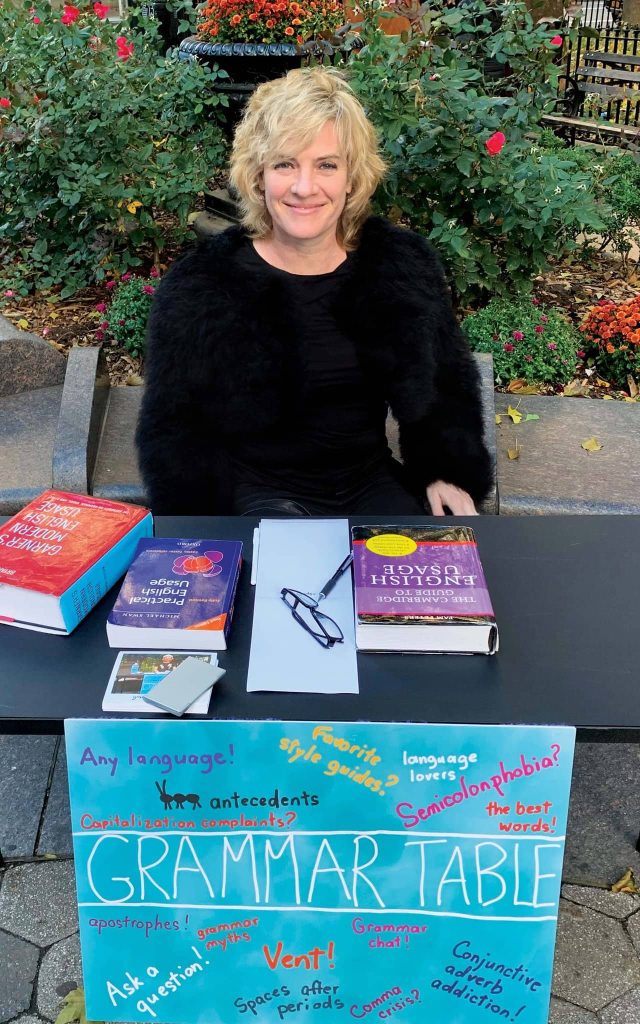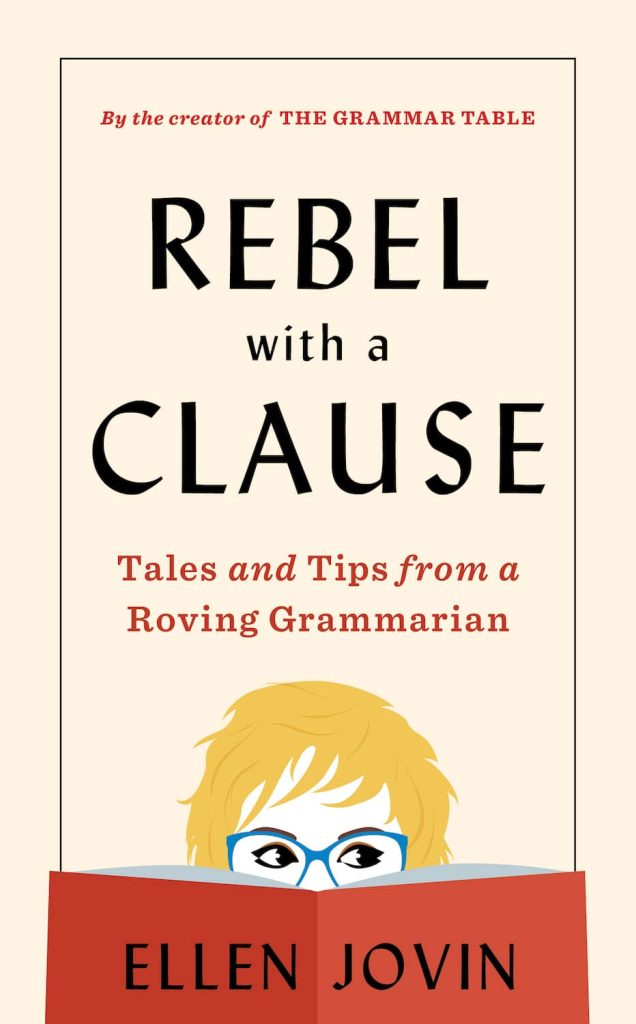When Twitter finally implodes like a neutron star, one of the things I will miss most is having lively discussions about grammar with an online community of fellow language enthusiasts.
After twenty years as a freelance translator and copywriter, the lines between a grammatical usage that is actually wrong and one that merely annoys the bejaysus out of me tend to get blurred from time to time, so it’s always good to get a collective second opinion.
Show me a sentence in French or German and I will nearly always be able to tell you whether it’s grammatically correct and explain why. This is just one of the many reasons why I’m such a big hit at parties.
But if a frustrated English learner corners me at that same party and asks me to explain why it’s correct to say “I have done my homework already” but not “I have done my homework at five o’clock”, I’ll probably end up climbing out the bathroom window on a big-print version of the Oxford English Dictionary.
The point is that many of us don’t understand the nuts and bolts of our own mother tongue as well as other languages that we may have studied – we just take them for granted and rely on native speaker instinct. Which, even more thrillingly, often varies from country to country and sometimes from region to region as well.
Anyway, the undisputed queen of the Twitter grammar nerds is Californian-born New Yorker Ellen Jovin, who brightens up our increasingly doom-laden feeds with regular doses of grammar questions, usage polls and language larks aplenty.
Together with her husband, Brandt Johnson, Ellen has been running a communication skills training consultancy called Syntaxis in New York City since 1999. But one morning in September 2018, she stepped outside her Manhattan home, crossed Broadway and unfolded her now-famous Grammar Table for the very first time, setting up just outside the Seventy-Second Street subway station.
Here, a cheerful homemade sign invited passers-by to consult Ellen on any aspect of grammar that was robbing them of their sleep – anything from “capitalization complaints” and “semicolonphobia” to “antecedents” or “conjunctive adverb addiction”. Or simply to “vent” if they needed to.

New Yorkers being shy and retiring by nature, it took a good thirty seconds for the first question to land. Among the earliest visitors was a married couple who, just minutes earlier, had been arguing about an apostrophe in a text message that the husband had sent to his wife: “Another fun afternoon for the Benson’s”. Luckily, Ellen had a logical explanation at the ready, helping to avoid a marital dispute of apostrophic proportions.
The Grammar Table was such a success all over New York that Ellen and Brandt decided – quite literally – to take the show on the road. They then proceeded to Thelma-and-Louise it around the United States, Ellen answering grammar questions for the masses and Brandt – a man his wife lovingly describes as having “apostrophes in all the right places” – popping up from behind his video camera to deliver the occasional zinger.
It’s these fun-filled adventures that form the backdrop to Ellen’s latest book, Rebel with a Clause: Tales and Tips from a Roving Grammarian. As you might expect from a woman who has dedicated her life to teaching, it’s the people she meets on her travels who take centre stage in this story. They are a varied and interesting bunch, hard-core grammar nerds rubbing shoulders with people who, by their own admission, couldn’t punctuate their way out of a wet paper bag.
So what kind of grammar questions are troubling the average visitor to the Grammar Table? As a quick glance at the table of contents will reveal, each of the book’s 49 chapters centres on a specific grammar issue, neatly distilled into memorable titles like “Possessed by Apostrophes” or “Whom You Gonna Call?”.
As well as bringing up evergreen favourites like the Oxford comma and singularly American concerns like the difference between “to lay” and “to lie”, some visitors are bothered by a growing tendency towards overcorrection (“between you and I” instead of “between you and me”). Others are uneasy about using “they” and “their” as a single pronoun (“everyone picks their own partner”) and “whose” for inanimate objects (“a tree whose name I forget”). And then there are the plurals of names ending in an S (is it “James’ book” or “James’s book”?) and no end of pesky homonyms (your/you’re, its/it’s). All of which are cleared up by Ellen with practised ease and a colourful cast of supporting characters.
(Speaking of homonyms, a classmate of mine in primary school called Emmett delighted in pronouncing the word as ‘hom-nyom-nyoms’ and this has remained lodged in my brain to this day. I’ve referred to him only by his first name as I’m sure he would prefer to remain a-nyom-nyom-ous.)
On a recent interview on BBC Radio 4, Ellen was introduced by presenter Michael Rosen as a “grammar fanatic”. I found this a disappointing choice of word: no one could ever accuse this particular guest of being “fanatical” about anything. Enthusiastic, passionate, devoted, yes – but not fanatical. A grammar enthusiast in the most endearingly Tiggerish sense of the word.
Of the chorus of high-profile names singing the praises of Rebel With A Clause on its back cover, it is Benjamin Dreyer, author of the bestselling Dreyer’s English, who really hits the nail on the head: “Ellen Jovin is, literally, a public grammarian, doling out advice [...] with sweetness and an enviable generosity of spirit.” After all, it is this unfailing sweetness, approachability and sense of fun that has made the Grammar Table a resounding success and her book such a hit with readers.

One of the things I like best about Rebel With A Clause – and, indeed, about its author – is that cheerful common sense always triumphs over po-faced prescriptivism. In the interest of writing natural, accessible English, Ellen is willing to boldly split infinitives, to start sentences with conjunctions, to add or omit serial commas as each situation requires, and to write “James’s book” rather than “James’ book” in line with how it is actually pronounced.
So what, you may ask, did a grizzled word-tamer like me learn from my travels through the 48 states and 49 chapters? Well, judging from the rather fun quizlets at the end of each chapter (and the rapturous rounds of imaginary applause that accompanied them), my English grammar is in good shape – as indeed you would expect from someone who writes for a living.
One thing I did learn was that I am in dire need of a refresher course in grammar terminology. While I was able to follow all of Ellen’s explanations easily enough, I suspect I would have struggled with a less forgiving, old-school grammar tome. And I doubt very much if I would have the vocabulary to be able to field English grammar questions myself, even if I did happen to know the answers.
But more than anything else, it was truly liberating to be able to put to rest, for once and for all, the fear of making generations of dusty-capped English teachers turn in their graves.
***
Ellen Jovin’s book, Rebel with a Clause: Tales and Tips from a Roving Grammarian, is now available from all good bookstores (yes, order it from your local bookstore!). At the time of writing, her husband Brandt is also working on a Grammar Table documentary using the footage he shot during their travels. Check Ellen’s website for regular updates.
Thanks as always to Ayal Pinkus for the illustration.

